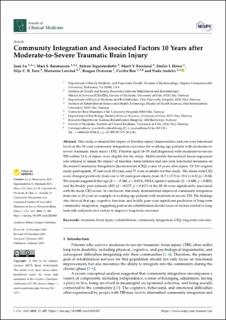Community Integration and Associated Factors 10 Years after Moderate-to-Severe Traumatic Brain Injury
Lu, Juan; Rasmussen, Mari Storli; Sigurdardottir, Solrun; Forslund, Marit Vindal; Howe, Emilie; Fure, Silje Christine Reistad; Løvstad, Marianne; Overeem, Reagan; Røe, Cecilie; Andelic, Nada
Peer reviewed, Journal article
Published version

View/
Date
2023Metadata
Show full item recordCollections
Original version
10.3390/jcm12020405Abstract
This study evaluated the impact of baseline injury characteristics and one-year functional
level on the 10-year community integration outcomes for working-age patients with moderate-to-
severe traumatic brain injury (TBI). Patients aged 16–55 and diagnosed with moderate-to-severe
TBI within 24 h of injury were eligible for the study. Multivariable hierarchical linear regression
was utilized to assess the impact of baseline characteristics and one-year functional measures on
the mean Community Integration Questionnaire (CIQ) scores 10 years after injury. Of 133 original
study participants, 97 survived 10 years, and 75 were available for this study. The mean total CIQ
score changed positively from one to 10 years post-injury, from 18.7 (±5.5) to 19.8 (±4.8) (p = 0.04 ).
The results suggested that age (β = −0.260, p = 0.013), FIM-Cognitive subscale (β = 0.608, p = 0.002),
and the bodily pain subscale (BP) (β = 0.277, p = 0.017) of the SF-36 were significantly associated
with the mean CIQ scores. In conclusion, this study demonstrated improved community integration
from one to 10 years in a sample of working-age patients with moderate-to-severe TBI. The findings
also showed that age, cognitive function, and bodily pain were significant predictors of long-term
community integration, suggesting post-acute rehabilitation should focus on factors related to long-
term risk and protective factors to improve long-term outcomes.
